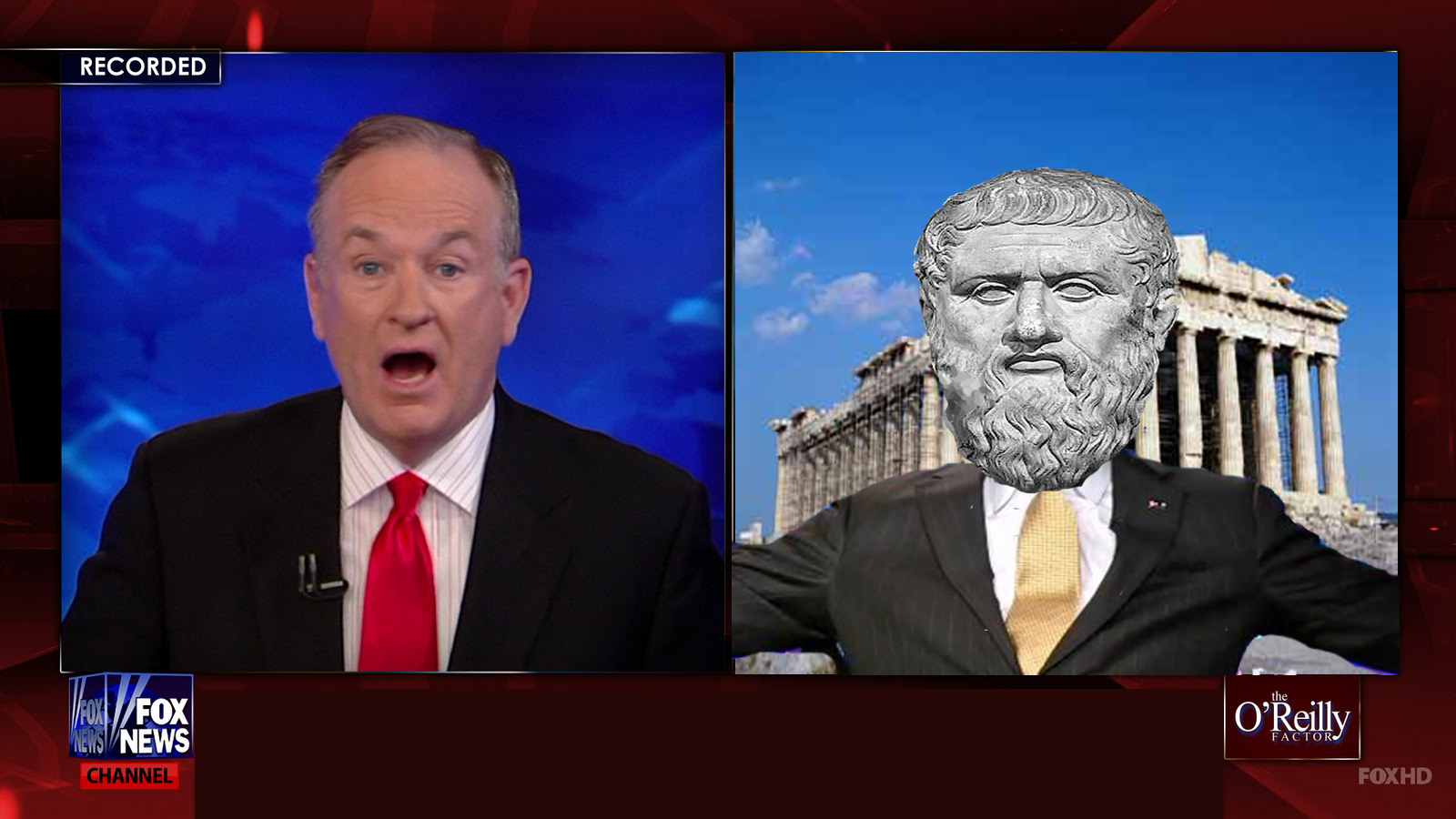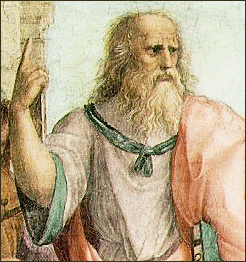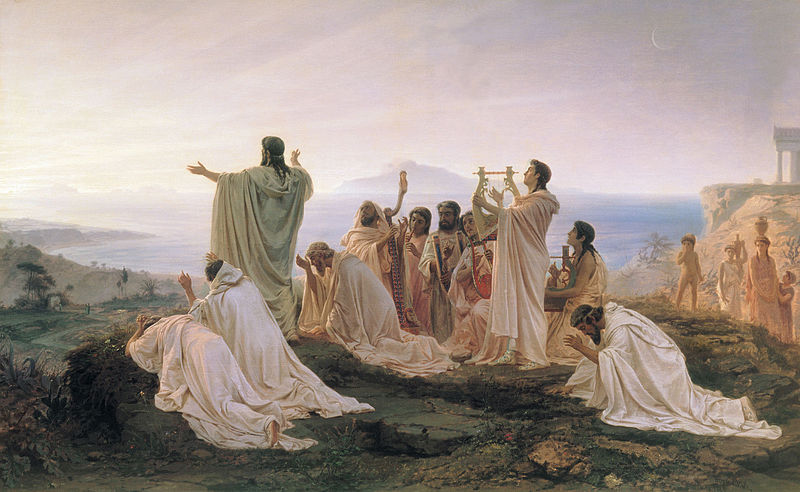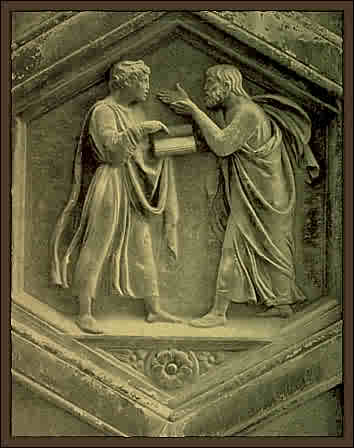Fair and Balanced Philosophy
Brad Gyori / Tribeca Flashpoint Media Arts Academy

In 1996, media titan Rupert Murdoch asked a former U.S. Republican Party political strategist Roger Ailes to found Fox News. From the outset, Fox was accused of being little more than a mouth piece for the Republican party, placing a right wing slant on much of its reportage. While this tactic was at odds with existing journalistic practices, it proved a ratings windfall, and Fox soon became the most watched news network in the U.S. Through the years, Fox’s coverage has become even more skewed, regularly trafficking in headlines such as “Obama Praises Indian Chief Who Killed U.S. General” and “Obama loves Gangsta rap.”

Defending news coverage filled with right wing propaganda has presented a significant public relations challenge for Ailes. To counter critics, he and the Fox team aggressively brand their approach “real journalism,” dubbing the popular O’Reilly Factor a “no spin zone,” and adopting the motto “fair and balanced.” Ailes did not invent this mode of rhetorical white washing. It actually dates back to an equally savvy political strategist: Plato.

Like Ailes, the founder of the western philosophic tradition once had political aspirations. The son of an aristocratic family, he was an elitist, who believed only a small fraction of the populous possesses the natural endowments to govern others. He was also a moralist, struggling to save society from contamination by dangerous thought. And he was an egoist, who believed that human beings are guided primarily by rational self-interested. Plato sought political office on several occasions with no success. But after his teacher Socrates was put to death for clashing with the authorities of his day, he abandoned political life in favor of scholarship.1 He did, however, go on to write The Republic,2 a work that describes a future utopia ruled by philosopher kings, wise men like him, but with real political clout. In his last and longest dialogue, Laws,3 Plato grows more pragmatic and more reactionary, imagining a future society where those who reject his philosophy are taken to the courts and, if found guilty, given no less than five years solitary confinement in a reformatory where they will be subjected to intensive indoctrination. If this fails to cure them, they should be put to death. Clearly, with such laws in place, it would be illogical to disagree with Platonic “reason.”
Another link between Platonism and Fox News is the use of religious doctrine to support truth-claims. Because Fox frequently panders to Christian right, pundits and correspondents often invoke biblical authority in contrast to that worldly stuff scientists call “empirical evidence.” What’s more, Fox producers often generate stories focusing on Christian themes, such as the perceived “attack on Christmas.”
[youtube]http://www.youtube.com/watch?v=PaOtvXJ2xHM[/youtube]
In a similar sense, many of Plato’s truth-claims were undergirded by dogma. According to classical scholar E.R. Dodds,4 his philosophy is a cross fertilization of Greek rationalism and various magico-religious ideas gleaned from shamanistic cults. Plato believed in reincarnation and felt that philosophers were uniquely gifted individuals capable of retaining knowledge of ultimate truths glimpsed during their passage through the afterlife.
This ideological component has its antecedents of the Pythagorean movement. Plato’s forbearer Pythagoras was a brilliant logician. He invented the mathematical formula known as “the Pythagorean Theorem.” And coined the term “philosopher.” But he was also the leader of a religious sect and often addressed his devotes from behind a gauzy veil.

Pythagoras claimed to channel the spirit of the late shaman Hermotimus.5 Such invocations were common in ancient Greece. Ritual mediums often conjured spirits of the dead in order to invest their pronouncements with divine authority. Thanks to the advent of the written word Plato was able to invert this process. His teacher, Socrates, does not speak through him. Instead, Plato speaks through Socrates. Likewise, Fox commentators frequently invoke deceased presidents, Washington, Jefferson, Lincoln and especially Ronald Reagan and speculate as to how they might respond to various current events. No news channel channels the dead as frequently or as overtly as Fox, and for true believers, such mystical invocations appear to lend credence to partisan hype masquerading as journalism.

This act of “textual ventriloquism” has several advantages. Claiming to speak for living authorities is problematic. The living can object when their views are misinterpreted or deliberately distorted, while the convenient silence of the dearly departed offers no such hazard. Also, the dead are no longer capable of contradicting or amending their own views. Posthumous utterances representing an evolving idiosyncratic worldview commenting on issues relevant to a particular place and time are thereby invested with the gravity of immutable truths. In this way, Fox conjures celestial imprimatur via the esteemed ghosts that tirelessly haunt its airwaves. What’s more, a pundit speaking in the name of a dead authority figure is donning a type of mask that partially disguise his own motives and worldview. This ideological camouflage allows him to feign objectivity without actually attempting it.

The methodological cornerstone of Platonic rationalism is the dialogue, the process of two or more people expressing different points of view in an effort to ascertain truth visa reasoned argument. By allowing the audience to consider more than a single perspective, the dialogue creates opportunities for productive debate in which ideas are asserted, challenged and improved in a dialectic fashion. This process can enhance understanding, but it can also delude. In Plato’s work, it does both. This is because, for him, the dialogue is more than just an objective discussion between equals; it is a rigged game, a rhetorical framing device that persuades by claiming to transcend rhetoric. Socrates appears to meet his opponents on equal footing, while Plato remains off stage and out of view. Meanwhile, Socrates always has the upper hand. Plato covertly controls everything from behind the scenes, and Socrates appears to win every argument. His (Plato’s) wisdom triumphs over all.

Plato was highly critical of the Sophists, a group of competing scholars who taught the art of rhetoric. He felt that their persuasive monologues were deceptive and inferior to his dialogues, which, he claimed, allowed readers to consider both sides of every argument. Yet, in many respects, Platonic dialogues are simply monologues in disguise. They persuade by appearing unbiased, but the author’s true intentions are always simmering just beneath the surface. This is what makes the dialogues so compelling and so deceptive. The Sophists never claim to be objective, but Plato does and this imbues his works with a sense of heightened credibility.
Fox News has made the dialogue a staple of their “fair and balanced” programming. As with a magician’s sleight of hand, it directs attention away from right wing pandering network executives wish to conceal. Rather than attempting to actually make their reportage less biased, they have constructed highly constrained editorial spaces in which a few handpicked liberals are permitted to express opposing views in an often-ineffectual manner.6 This is what passes for objective journalism on Fox and the illusion is somewhat convincing as long as viewers don’t question the motives of the supposedly neutral moderator, or examine how the show’s producers have chosen to frame the topic of discussion.
[youtube]http://www.youtube.com/watch?v=ulbu2RBksLw[/youtube]
Like Plato, Roger Ailes has anointed himself a sage capable of discerning ultimate truth more effectively than others. Yet at first blush, he appears a somewhat ironic figure, one whose authority is dependent on a means of expression he seems determined to disparage. Ailes, after all, is high power media mogul who constantly disparages the media itself. He wants to convince viewers that this is an act of alchemy, not hypocrisy. The first step involves insisting that the media at large is inherently liberal and thus corrupt. Only then, can the Fox News team perform the feat of magically transforming this base material into something of true value. They do so by fighting fire with fire, using media to transform itself.
In a similar sense, Plato considered the written word corrupt. In Phaedrus, he compares writing to orality. He is critical of the former and praises the latter. For the first time in western thought, two types of media are evaluated in relation to one another and media theory is born. Plato even conflates literacy with a poison (pharmakon) that will cause human memory to atrophy. This implies a counter conflation, namely, that Plato’s dialogue is the cure. Plato, the philosopher, may disparage the written word, but Plato, the alchemist, needs it, as his dialogue is the philosopher’s stone that can insure its transmutation. He is not a hypocrite for using literacy to serve his own ends. He is a redeemer, a purifying filter, distilling away toxic impurities.
In the essay “Plato’s Pharmacy,” Jacques Derrida7 challenges the hidden biases of this supposedly impartial dialogue. He states that Plato’s critique of the written word is a self-serving gesture, perpetuating long-standing patriarchal norms. In Phaedrus, Plato (through Socrates) suggests that truth (logos) committed to words is like a child orphaned by his father. By redeeming the word, Plato strives to return it—and all of us—to the care of a benevolent and all-knowing patriarch. This too, is in keeping with the Fox News bias toward “family values” and patriarchal norms.
In addition to disparaging the written word, Plato condemns poetry and the theater for a tendency to trigger mimetic acts. He fears that uneducated readers and audience members lack the critical faculties to entirely distinguish between reality and stagecraft and might be compelled to imitate the transgressions dramatized in works of fiction. In The Republic, written around the same time as Phaedrus—about 370 BC—Plato suggests that community leaders should supervise poets, and compel them to praise virtue in their poems. Poems that focus on vice are compared to poisonous weeds corrupting souls. Here is the first “media effects” argument.8 Plato insists that society is under threat from nefarious influences eroding social norms. His enemies, the sophists, are deceivers, blinding humankind to the fundamental Truths of existence.
In a similar sense, Fox News host, Bill O’Reilly is a self-described “cultural warrior, determined to protect his audience from harmful images and ideas circulating in the “liberal media.” To this end, O’Reilly often tells those who disagree with him to “shut up” in an attempt to silence perspectives that don’t align with the Republican talking points he is obliged to parrot.
[youtube]http://www.youtube.com/watch?v=vTkFU4MtubU[/youtube]
Plato tells us Socrates was the wisest man because he claimed to know nothing. But perhaps, Plato was the shrewdest man because he claimed to lack an agenda. The apparent parallels I have sketched between the methods of Fox News and the traditions of Platonism unsettle familiar notions of objective journalism and unbiased philosophy. They also raise concerns regarding the long-term credibility of a two party democracy. Whenever two parties—individual or collective—converse, their dialogue is not occurring in a value-free vacuum. Some unseen philosopher king, or collective of like-minded stakeholders is limiting and guiding what can be spoken and heard. Yet acknowledging that all public debates are inevitably framed and distorted by private interests is not the same as accepting that all accounts of the so-called “objective truth” are equally biased. The US may always have a two party system, but that ongoing political dialogue need not become as right leaning as Fox News’s narrowing circumscribed rhetorical universe. And even Fox, devoted as it is to carrying out neo-conservative marching orders, will never be an entirely closed system. This is because no dialogue, however carefully constrained, is ever entirely predictable. Discourses are living things comprised of complex individuals who share similar ideological commitments, but are not perfectly in lockstep regarding all issues. Thus even in a tightly controlled discursive space there are opportunities for legitimate debate and even dissent, not necessarily been the straw-man liberal pundits, Fox sets up and knocks down for sport, but between the Fox correspondents owe varying degrees of allegiance to different groups: The Tea Party, the Christian right, the NRA, Republican politicians and big business. Those same reporters are also committed to different ideological agendas: nationalism, capitalism, neo-conservatism, elitism, populism, patriarchy, jingoism, heteronormativity, militarism, and, yes, even journalistic ethics. These competing commitments and perspectives complicate their ability to present a perfectly united front.
As public discourse becomes more multi-centered and complex, we are required to think, not of the public sphere, but of the public spheres—plural. Even a dialogue between two people draws on a number of competing discourses. This means, the producers of Fox News can never perfectly contain and control what occurs on their airwaves. And indeed, many liberal pundits including Cornel West, Jon Stewart and Bill Clinton have successfully challenged the Fox News team on their own turf, undermining the republican party’s ability to always bring its favorite media lapdog perfectly to heel. While it is in the best interest of moneyed elites to make it appear as if the motives and beliefs of various right wing discourses are perfectly aligned, the general public benefits more when their contrasting perspectives are exposed and some semblance of actual debate is generated within the Fox News universe. This is the best hope of keeping Fox News a little more honest, and perhaps even remotely “fair and balanced.”
Image Credits:
1. Bill O’Reilly, Plato, Parthenon
2. Roger Ailes
3. Plato
4. Pythagoreans
5. Paul Ryan
6. The Dialogue
7. Socrates
Please feel free to comment.
- Taylor, A.E. (1926). Plato: The Man and His Works. New York: Dover Publications, Inc. [↩]
- Plato. (2007.) The Republic. Lee, D. (Trans.). New York: Penguin Classics. [↩]
- Plato. (2010). The Laws. United States: CreateSpace Independent Publishing Platform [↩]
- Dodds, E.R. (1951) The Greeks and the Irrational. Berkeley: University of California Press. [↩]
- Dodds, E.R. (1951). The Greeks and the Irrational. Berkeley: University of California Press. [↩]
- Greenwald, R. (Producer & Director). (2004). Outfoxed: Rupert Murdoch’s War on Journalism. United States: MoveOn.org & Brave New Films. [↩]
- Derrida, J. (1991). A Derrida Reader: Between the Blinds. Kamuf, P., (Ed.) New York: Columbia University Press. [↩]
Nehamas, A. & Woodruff, P. (1995). “Introduction.” Phaedrus. (A. Nehamas & P. Woodruff, Trans.), Indianapolis: Hackett Publishing Company, Inc. [↩]